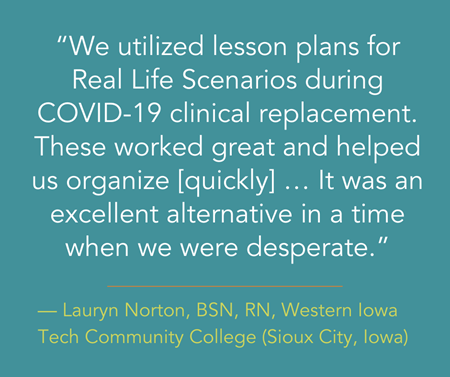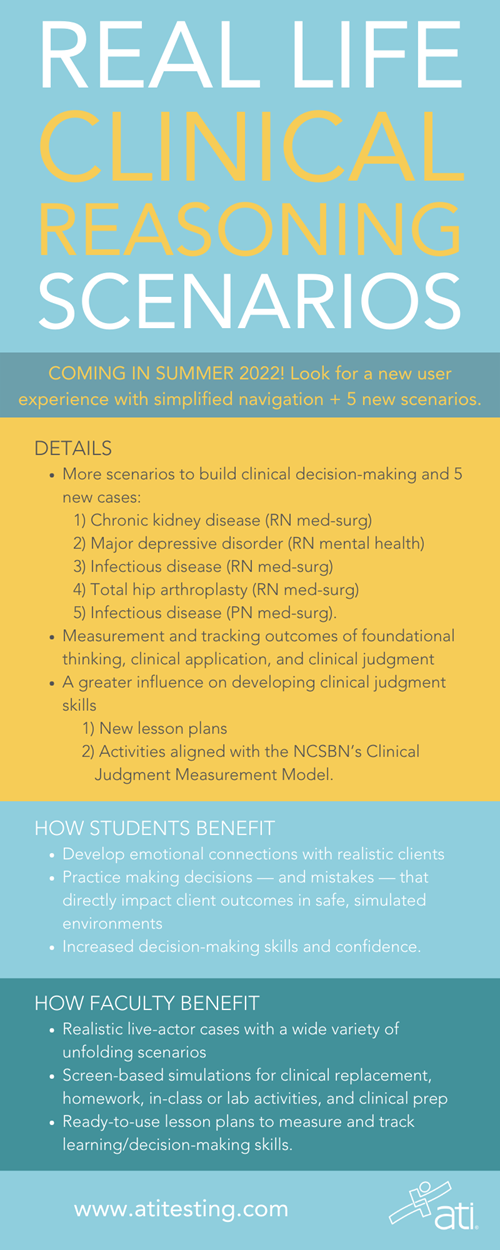WHY COMPETENCY-BASED CURRICULUM IS NECESSARY IN NURSING
AACN is transforming nursing education with the new Essentials
The newly released AACN Essentials isn’t a change for nursing education. It is a transformation.
 Beth Phillips, PhD, RN, CNE, CHSE, Strategic Nursing Advisor, and Kelly Simmons, DNP, RN, ATI Nursing Education Consultant, closely follow the guidance and research that the American Association of Colleges of Nursing (AACN) delivers. So, when the new AACN Essentials was released, the pair spent hours reviewing the document.
Beth Phillips, PhD, RN, CNE, CHSE, Strategic Nursing Advisor, and Kelly Simmons, DNP, RN, ATI Nursing Education Consultant, closely follow the guidance and research that the American Association of Colleges of Nursing (AACN) delivers. So, when the new AACN Essentials was released, the pair spent hours reviewing the document.
Their research led to a decisive conclusion: The AACN Essentials was pointing toward a transformation of nursing.
Why is transformation needed? 4 key reasons
1) A rapidly evolving healthcare system
2) Different workforce expectations
3) A move from care in hospitals to the community
4) An explicitly defined need for professional nursing-practice readiness — an obvious nod to the need for stronger clinical judgment skills
To address these reasons, the new Essentials advocates for nursing education to implement a competency-based framework.
WHAT YOU CAN DO: CROSSWALK YOUR CURRICULUM
ATI’s crosswalk document maps your curriculum with the new domains, competencies, and subcompetencies. Use it to:
- Identify gaps.
- Determine if your curriculum fully integrates the competencies.
- Identify activities to assess achievement of competencies.
- Brainstorm how to include/assess all competencies.
WHY ADN PROGRAMS SHOULD CARE ABOUT AACN ESSENTIALS
 The AACN created the Essentials for baccalaureate and higher nursing programs but recognizes many students move from ADN programs in community colleges to BSN programs. As a result, AACN endorses articulation agreements with BSN programs to prepare students for this academic progression.1
The AACN created the Essentials for baccalaureate and higher nursing programs but recognizes many students move from ADN programs in community colleges to BSN programs. As a result, AACN endorses articulation agreements with BSN programs to prepare students for this academic progression.1
NEXT STEPS
• Discover how ATI’s Program Manager has been updated to align with the new Essentials.
• See how Real Life is incorporating the Essentials (below and in this downloadable PDF).
WHAT’S COMING? REAL LIFE CLINICAL REASONING SCENARIOS
 Look for a new user experience with simplified navigation plus five new scenarios.
Look for a new user experience with simplified navigation plus five new scenarios.
Available when? Summer 2022
DETAILS:
- More scenarios to build clinical decision-making and 5 new cases:
- Major depressive disorder (RN mental health)
- Chronic kidney disease (RN med-surg)
- Infectious disease (RN med-surg)
- Total hip arthroplasty (RN med-surg)
- Infectious disease (PN med-surg).
- Measurement and tracking outcomes of foundational thinking, clinical application, and clinical judgment
- A greater influence on developing clinical judgment skills
- New lesson plans
- Activities aligned with the NCSBN’s Clinical Judgment Measurement Model.
HOW STUDENTS BENEFIT:
- Develop emotional connections with realistic clients
- Practice making decisions — and mistakes — that directly impact client outcomes in safe, simulated environments
- Increased decision-making skills and confidence.
HOW FACULTY BENEFIT:
- Realistic live-actor cases with a wide variety of unfolding scenarios
- Screen-based simulations for clinical replacement, homework, in-class or lab activities, and clinical prep
- Ready-to-use lesson plans to measure and track learning/decision-making skills.
REAL LIFE TESTIMONIAL
“We utilized lesson plans for Real Life Scenarios during COVID-19 clinical replacement. These worked great and helped us organize [quickly] … It was an excellent alternative in a time when we were desperate.”
—Lauryn Norton, BSN, RN, Western Iowa Tech Community College (Sioux City, Iowa)
RESOURCES
1Academic progression in nursing: Moving together toward a highly educated nursing workforce. Accreditation Commission for Education in Nursing; March 2019. Accessed Nov. 3, 2021. https://www.aacnnursing.org/Portals/42/News/Position-Statements/Academic-Progression.pdf.

